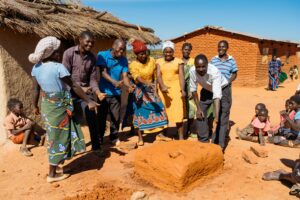Scaling up PIP in Malawi

Over the last year the programmes in Malawi has made huge wins in scaling up PIP. The PIP approach contributes to the improvement of children’s wellbeing in rural areas where agriculture remains the most important form of livelihood. The benefits of PIP translate not only into improved basic nutritional needs but also into improved steady income, environmental stewardship, and sustainable change.
Key results
In CCCD Mwalweni, twelve village vision plans were drawn up, with increased acreage of farmland under sustainable land management. In CCCD Zilakoma, there is an 88% adoption rate of PIP technologies. A total of 97.6 acres of farmland has been conserved with marker ridges fortified by vetiver, mulching, and organic manure applications. The accumulation of small livestock such as chickens and goats has also been remarkable. The majority (80%) of farmers concentrated on local Mbeya fertilizer, as it enables farmlands to regain fertility and directly addresses the problem of rising fertilizer prices in Malawi.
Environmental conservation
Aditionally Help a Child Malawi expanded environmental conservation efforts through the green business initiative to help CCCD communities become more resilient to climate shocks. This initiative focused on promoting energy-saving technologies and encouraging forest conservation practices through climate-resilient livelihoods. With climate-smart programming, CCCD programmes in Malawi accelerated clean cooking through the introduction of energy-saving stoves in all the CCCD catchment areas. A total of 1,095 households use these stoves.
Woodlot establishments and forest-based enterprises are other examples of interventions that were implemented to ensure that forest resources are sustainably managed to contribute to climate-resilient livelihoods in 2024. In 2024, 850 young people received guidance on woodlot establishment and management and a total of 193,000 trees were planted through this initiative.
